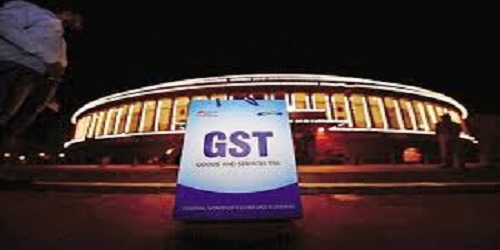Indian President Pranab Mukherjee gave his assent to the GST constitution amendment bill that enables the implementation of this indirect tax reform and the government has managed to close out processes within deadlines, raising expectations that GST will be rolled out on 1 April next year.
About GST Bill :
- The Goods and Services Tax Bill or GST Bill, officially known as The Constitution (One Hundred and Twenty-Second Amendment) Bill, 2014, proposes a national Value added Tax to be implemented in India from 1 April 2017.
- “Goods and Services Tax” would be a comprehensive indirect tax on manufacture, sale and consumption of goods and services throughout India, to replace taxes levied by the central and state Goods and Services Tax would be levied and collected at each stage of sale or purchase of goods or services based on the input tax credit method.
- This method allows GST-registered businesses to claim tax credit to the value of GST they paid on purchase of goods or services as part of their normal commercial activity. Taxable goods and services are not distinguished from one another and are taxed at a single rate in a supply chain till the goods or services reach the consumer.
- Administrative responsibility would generally rest with a single authority to levy tax on goods and services. Exports would be zero-rated and imports would be levied the same taxes as domestic goods and services adhering to the destination principle.
- The introduction of Goods and Services Tax (GST) would be a significant step in the reform of indirect taxation in India. Amalgamating several Central and State taxes into a single tax would mitigate cascading or double taxation, facilitating a common national market. The simplicity of the tax should lead to easier administration and enforcement.
- From the consumer point of view, the biggest advantage would be in terms of a reduction in the overall tax burden on goods, which is currently estimated at 25%-30%, free movement of goods from one state to another without stopping at state borders for hours for payment of state tax or entry tax and reduction in paperwork to a large extent.
- What changes there would be if India launches GST- “The tax rate under GST may be nominal or zero rated for the time being. It has been proposed to insulate the revenues of the States from the impact of GST, with the expectation that in due course, GST will be levied on petroleum and petroleum products.”
- The central government has assured states of compensation for any revenue losses incurred by them from the date of introduction of GST for a period of five years.

- As India is afederal republic GST would be implemented concurrently by the central government and by state governments.
President’s Assent:-
The Bill was sent to the President’s Secretariat after as many as 19 States ratified it. The States that have passed legislation are Assam, Bihar, Jharkhand, Chhattisgarh, Himachal Pradesh, Gujarat, Madhya Pradesh, Delhi, Nagaland, Maharashtra, Haryana, Sikkim, Mizoram, Telangana, Goa, Odisha, Rajasthan, Arunachal Pradesh and Andhra Pradesh.
- The enactment of the bill sets the stage for setting up of the all-powerful GST council—a representative body comprising state finance ministers and the Union finance minister—which will finalize the design of GST.
- The council will decide on contentious issues such as the tax rates and sharing of administrative control between the centre and the states, as well as the revenue threshold for traders below which they will be exempt from GST.
- The States and the Centre are working overtime and talking to stakeholders to draft the Central GST, State GST and Integrated GST laws, which are to be passed in the winter session of Parliament.
- The CGST and IGST will be drafted on the basis of the model GST law. The States will draft their respective GST (SGST) laws with minor variation, incorporating State-based exemptions. The IGST law would deal with inter-State movement of goods and services
AffairsCloud Recommends Oliveboard Mock Test
AffairsCloud Ebook - Support Us to Grow
Govt Jobs by Category
Bank Jobs Notification





